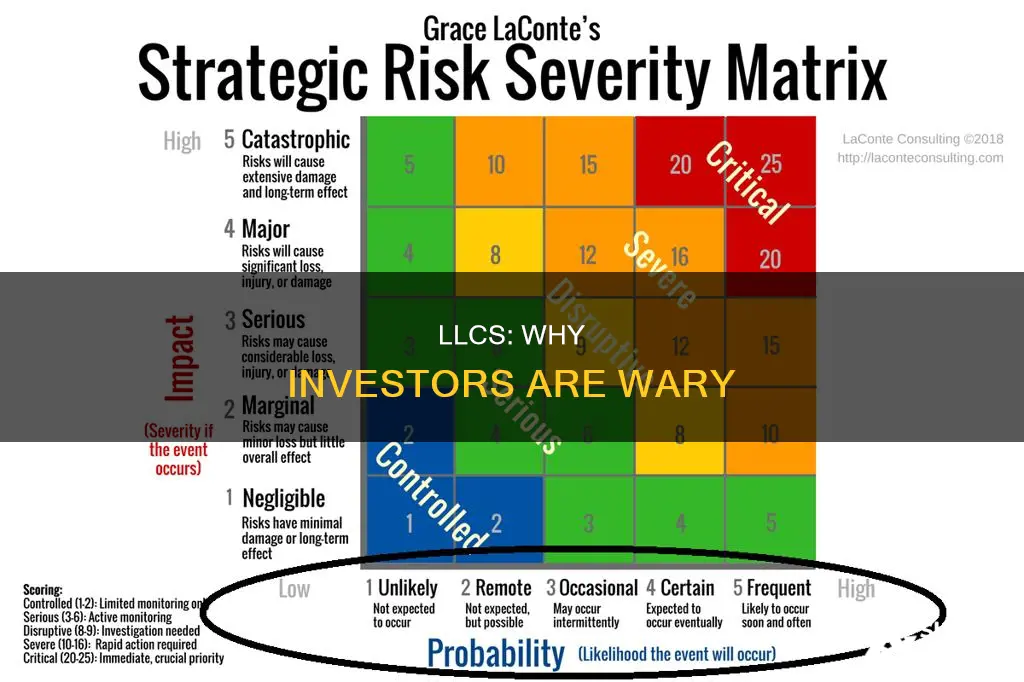
There are several reasons why investors might avoid investing in an LLC. One of the main issues is the tax implications, which can deter or even prevent venture capitalists from investing. LLCs are taxed as partnerships, meaning investors are taxed on the entity's income, even in years when no cash is distributed to them personally. This complicates their personal tax situation, and they could be taxed in other states if the business has an active trade or business outside of their home state. Additionally, some investors, such as venture capital funds, cannot invest in LLCs due to their tax-exempt partners.
Another reason is that investors often prefer the familiarity and simplicity of owning stock in a C-Corp. Investors in early-stage businesses typically want a simple investment process, without any intervening tax complications.
LLCs also offer less flexibility in terms of company management and leadership, as all managers must be members, and there is no opportunity to bring in external leadership. This reduces the entrepreneur's flexibility and can be unattractive to investors.
Finally, raising capital through an LLC is more complex and difficult than through a corporation, and LLCs are generally obligated to make tax distributions to members to cover tax obligations.
| Characteristics | Values |
|---|---|
| Tax implications | Investors don't want to complicate their personal tax situation by becoming a member of an entity that is taxed as a partnership |
| Investor type | Some investors, such as venture capital funds, can't invest in pass-through companies such as LLCs |
| Investor location | If the business has an active trade or business in other states, passive investors may become subject to income tax in those other states |
| Stock preference | Investors in early-stage businesses usually just want to make a simple investment and acquire a capital asset (stock) |
| Corporate governance requirements | Outside investors are wary of LLCs because of the limited corporate governance requirements |
What You'll Learn

Investors don't like the tax implications of an LLC
The tax implications of an LLC can be a complex and challenging issue for investors. While LLCs offer certain benefits, such as limited personal liability and pass-through taxation, there are also some drawbacks that investors may find unfavourable. Here are some reasons why investors may not like the tax implications of an LLC structure:
Pass-Through Taxation
One of the main reasons investors may be hesitant to invest in an LLC is the pass-through taxation structure. In an LLC, the business income "passes through" to the owners or members, who then report and pay taxes on that income through their personal tax returns. This means that investors are taxed on the LLC's income, even if they do not receive any cash distributions. Most investors prefer to invest in companies where they are not taxed on the entity's income unless they actually receive cash distributions.
State Income Taxes
LLCs can also create complications for investors when it comes to state income taxes. By investing in an LLC, an investor may become liable for state income taxes in states where the LLC conducts business but where the investor is neither a resident nor a visitor. This can result in unexpected tax obligations and additional costs for the investor.
No Qualified Small Business Stock Benefit
Another disadvantage of investing in LLCs is that they cannot issue qualified small business stock. Qualified small business stock offers special reductions in long-term capital gains tax treatment on the sale, including the potential exclusion of up to 100% of the gain from taxation. This benefit is not available to investors in LLCs.
Complexity of Tax Rules
The tax rules governing LLCs, especially those related to income allocation among owners, can be complex and difficult to understand. Investors may receive a Schedule K-1 from the LLC, indicating their share of income, losses, expenses, and other tax items, without a clear understanding of the allocation or the underlying calculations.
Delay in Tax Documents
When an LLC sends tax documents to its investors, there is often a delay. Investors may not receive the necessary tax information until September of the following year, which can make tax planning and preparation challenging.
Potential for Capital Calls
LLC agreements may include provisions that allow managers or a majority of members to require capital contributions from all members. This means that investors could be obligated to make larger financial commitments than they had initially intended, creating uncertainty and potential financial strain.
Investor Protective Covenants
LLC agreements may not always include protective covenants for investors. These covenants, such as information rights, disclosure and approval of conflicted transactions, and co-sale rights, provide investors with additional protections and rights. The absence of these covenants can make investors uncomfortable and less likely to invest.
In summary, while LLCs offer certain benefits, such as limited personal liability, they also present some tax implications that investors may find unfavourable. It is important for investors to carefully consider the tax consequences of investing in an LLC and seek professional advice to ensure they understand the potential impact on their personal tax obligations.
VC Bias: Do Looks Matter?
You may want to see also

Many investors can't invest in LLCs
Some investors, such as venture capital funds, cannot invest in pass-through companies like LLCs. This is because the VC fund has tax-exempt partners that cannot receive active trade or business income due to their tax-exempt status.
Furthermore, because some VCs manage public funds, they are barred from investing in LLCs. And since most venture capital firms are organized as limited partnerships, they are restricted from investing in S-corporations, which require “natural persons” as investors.
Additionally, S-corps only allow a maximum of 100 stockholders, which limits growth. Thus, by investing solely in C-corporations, VCs can avoid numerous legal entanglements and gain the most legal flexibility when it comes to investing.
Other reasons investors don't like LLCs
- Investors don't like the tax implications of an LLC. They don't want to complicate their personal tax situation by becoming a member of an entity (i.e. an LLC) that is taxed as a partnership, because as a partner, they’ll be taxed on the entity’s income even in years when no cash is distributed to them personally.
- Investors are potentially taxed in other states. If the business has an active trade or business in other states, passive investors may become subject to income tax in those other states. This is a major turn-off for investors.
- They prefer owning stock in a C-Corp. Investors in early-stage businesses usually just want to make a simple investment, acquire a capital asset (the stock), and avoid any intervening tax complications until the stock is sold and there’s a capital gain or loss event.
Funding LLC Investors
You may want to see also

Investors are potentially taxed in other states
Investors are often deterred from investing in LLCs due to the tax implications. If the business has an active trade or business in other states, passive investors may become subject to income tax in those other states. This is a major turn-off for investors.
LLCs are taxed as partnerships, which means that their owners are taxed on the LLC's income, even in years when no cash is distributed to them personally. This can complicate an investor's personal tax situation, as they will be taxed on the LLC's income even if they do not receive any cash distributions.
Additionally, if non-US persons invest in US LLCs, they may also be subject to income tax in the US. This further complicates the tax situation for investors and is another reason why they may be hesitant to invest in LLCs.
To avoid these tax complications, investors often prefer to own stock in a C-Corporation, which has a simpler tax structure. By investing in a C-Corporation, investors can make a simple investment, acquire a capital asset, and avoid any intervening tax complications until the stock is sold and there is a capital gain or loss event.
Who Invests in the Stock Market?
You may want to see also

They prefer owning stock in a C-Corp
One of the main reasons investors prefer owning stock in a C-Corp is the tax implications. C-Corps are taxed differently from LLCs and S-Corps, and this can be more favourable for investors. C-Corps are subject to state and federal income tax on their net income, and shareholders are taxed on dividends, distributions, or salaries they receive from the corporation. While this might seem like a disadvantage, it can actually work in the shareholder's favour. In an LLC or S-Corp structure, the company's income taxes pass through to its owners, who then pay tax themselves. This means that LLC investors could end up paying tax on the company's income even if they don't receive any distributions from the company. With a C-Corp, investors only pay tax on the money they actually receive.
Another advantage of C-Corps is that they are designed to distribute ownership. C-Corps have shares that are freely transferable, and there are no restrictions on the number of shareholders or who can be a shareholder. This makes buying and selling shares in a C-Corp much easier and more attractive to investors.
C-Corps also benefit from strong legal precedent. As they have been around for a long time, there is a lot of established case law and legal precedent for C-Corps, which can provide more certainty for investors.
Additionally, C-Corps have the ability to issue preferred stock, which grants certain rights to shareholders, such as priority in receiving dividends and preferences in the event of a liquidation. This can be appealing to investors as it provides them with additional protection.
Finally, C-Corps are often seen as more attractive to potential investors because they are better able to raise funds through the sale of stock. This makes them a good option for small business owners looking to attract venture capital and other types of equity financing.
Young Investors: Where to Begin?
You may want to see also

LLCs are Not Eligible for Section 1202 Gain Exclusion
One of the main reasons people may be hesitant to invest in LLCs is the tax implications, which can deter or even prevent investors from investing.
Section 1202 provides a significant tax incentive for investors in small businesses, allowing them to exclude a minimum of $10 million in federal income tax gains in connection with the sale of QSBS held for more than five years. This gain exclusion is one of the most attractive tax benefits available to founders and venture capitalists.
By investing in an LLC, individuals would miss out on this tax benefit, which could result in a higher tax liability when they sell their investment. This is a crucial consideration for early-stage investors, who often seek to minimize taxes and maximize returns.
In addition to the tax implications, there are other reasons why investors may be hesitant to invest in LLCs. LLCs are also seen as having limited corporate governance requirements, which can make outside investors wary. The complexity of transferring ownership in an LLC can also be a deterrent for investors who are looking for a quick and easy exit strategy.
Overall, while LLCs offer benefits such as management flexibility, tax benefits, and protection of personal assets, the ineligibility for Section 1202 Gain Exclusion is a significant factor that may impact an individual's decision to invest in this type of entity.
Why Pay for Aaii Membership?
You may want to see also
Frequently asked questions
There are several reasons why people may choose not to invest in LLCs. One of the main reasons is the tax implications, which can complicate and negatively impact an investor's personal tax situation. LLCs are also not eligible for Section 1202 Gain Exclusion, an exciting tax incentive that allows for the exclusion of up to $10 million in capital gains from the sale of qualified small business stock. Additionally, certain investors, such as venture capital funds, are unable to invest in LLCs due to their tax-exempt partners. The management structure of LLCs, which offers more flexibility and less implicit structure, may also be less appealing to investors who prefer the familiarity and simplicity of owning stock in a C-Corp.
Despite the drawbacks, there are some advantages to investing in an LLC. LLCs offer management flexibility, tax benefits, and protection of personal assets, making them a popular choice for small businesses. The pass-through taxation structure of LLCs means that members pay taxes on the business's income instead of the entity itself, which can result in tax savings. LLCs also provide enhanced asset protection, ensuring that only the assets held by the LLC are at risk in the event of a lawsuit or financial hardship.
Investing in an LLC typically involves contributing funding as a member of the company. All owners of an LLC are considered members, and the company can be either member-managed or manager-managed. It is important to have a detailed operating agreement in place that outlines important membership details, management structure, and financial contributions.







